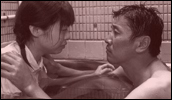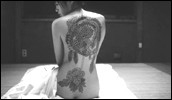Shojo
- Year
- 2001
- Original title
- Shojo
- Japanese title
- 少女
- Director
- Cast
- Running time
- 132 minutes
- Published
- 31 December 2001



by Tom Mes
When actors make their directorial debuts and give themselves the lead role, the end result is all too often a thinly veiled showcase for a star's vanity. This is the trap that Eiji Okuda has fallen into with his debut feature Shojo, in which the director/actor plays a suburban beat cop who has women of all ages swooning at his feet.
Though based on a short story by Mikihiko Renjo, Shojo plays like a second-rate Lolita clone. With his work amounting to little more than making bicycle rounds through a sleepy suburb, policeman Tomokawa alternates his time between bedding sex-starved housewives and playing father figure to retarded teenager Sukemasa. While resting from his libidinous activities in a local bar, he is approached by 15-year-old Yoko, who has picked up on the enjo kosai thing and offers to have sex with him for money.
The two inevitably run into one another again and a relationship between them develops when it becomes clear that Yoko is Sukemasa's brother and that both children are the offspring of one of Tomokawa's former lovers, an abrasive, self-centered, and money-grabbing woman. Additionally, Yoko's grandfather is the artist responsible for the tattoo of a phoenix emblazoned on Tomokawa's back (one of the many elements that scream rather than hint that Tomokawa was once a real don't-mess-with-me tough guy). With Tomokawa rising to the task of protecting the two teenagers from their loveless mother (which for the greater glory of Okuda's image involves "sacrificing" himself to the woman's sexual urges) and her lecherous husband - who also lusts after Yoko - the script calls for him to be the righteous hero on so many occasions it's a surprise Okuda doesn't turn up in a Superman costume at some point.
Eiji Okuda is known mainly for his longtime collaborations with yakuza movie specialist Rokuro Mochizuki, who all too often cast the actor as characters with similarly irresistible sexual magnetism in such films as A Yakuza in Love and The Wicked Reporter series. But while Mochizuki is a filmmaker of undeniable ability, Okuda is the kind of director who thinks that adding French chansons to the soundtrack is enough to make for a convincing romantic film. But rather than being romantic, Shojo has all the substance of a 1970s softcore porn flick. This is indicated in the opening scene, which shows Tomokawa interrupting his beat to get a haircut. No sooner has he walked into the barber shop or the sultry thirtysomething hairdresser has shed her wardrobe to get it on with the uniformed stud, who naturally admires his handiwork in the mirror accompanied by the woman's moans and yells.
Not the slightest attempt at substance is made with regards to the characters either, which in some cases throws the film in dubious light. The pivotal figure of Yoko doesn't so much resemble a three-dimensional 15-year old as an overly precocious, idealised fantasy image unsuccessfully intended to excuse the portrayal of a pedophilic relationship. Rather than add substance and depth to his film, Okuda instead tries to tempt the indiscriminate viewer with an overdose of quasi-profound quaint traditionalism in the shape of kimonos and tattoos. When Yoko finally has herself tattooed with a female phoenix to signify her eternal bond with Tomokawa, the whole scene just oozes calculated Japaneseness. With two paper-thin fantasy figures at its center, it is the fitting summation to this shallow, overlong, and at times reprehensible vanity piece.